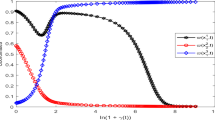Abstract
We introduce the dependent splitting game, a zero-sum stochastic game in which the players jointly control a martingale. This game models the transmission of information in repeated games with incomplete information on both sides, in the dependent case: The state variable represents the martingale of posterior beliefs. We establish the existence of the value for any fixed, general evaluation of the stage payoffs, as a function of the initial state. We then prove the convergence of the value functions, as the evaluation vanishes, to the unique solution of the Mertens–Zamir system of equations is established. From this result, we derive the convergence of the values of repeated games with incomplete information on both sides, in the dependent case, to the same function, as the evaluation vanishes. Finally, we establish a surprising result: Unlike repeated games with incomplete information on both sides, the splitting game has a uniform value. Moreover, we exhibit a couple of optimal stationary strategies for which the stage payoff and the state remain constant.
Similar content being viewed by others
Notes
See Sect. 3.4.
For any countable set X, we denote by \(\Delta (X)\) the set of probability measures over X, which is the set of sequences \((a_x)_{x\in X}\) such that \(\sum _{x\in X} a_x=1\) and \(a_x\ge 0\), for all \(x\in X\).
Laraki [5] considers a more abstract setting in which K and L are not supposed to be finite sets, but rather some convex, compact metric spaces.
References
Aumann RJ, Maschler M, Stearns RE (1995) Repeated games with incomplete information. MIT Press, Cambridge
Blackwell D, Dubins LE (1975) On existence and non-existence of proper, regular, conditional distributions. Ann Probab 3:741–752
Cardaliaguet P, Laraki R, Sorin S (2012) A continuous time approach for the asymptotic value in two-person zero-sum repeated games. SIAM J Control Optim 50:1573–1596
Heuer M (1992) Asymptotically optimal strategies in repeated games with incomplete information. Int J Game Theory 20:377–392
Laraki R (2001) The splitting game and applications. Int J Game Theory 30:359–376
Mertens J-F, Zamir S (1971) The value of two-person zero-sum repeated games with lack of information on both sides. Int J Game Theory 1:39–64
Mertens J-F, Zamir S (1980) Minmax and maxmin of repeated games with incomplete information. Int J Game Theory 9:201–215
Shapley LS (1953) Stochastic games. Proc Natl Acad Sci 39:1095–1100
Sion M (1958) On general minimax theorems. Pac J Math 8:171–176
Sorin S (2002) A first course on zero-sum repeated games. Springer, Berlin
Acknowledgements
This work started as part of my Ph.D. under the supervision of Sylvain Sorin. I am very much indebted to him for motivating this research and his insightful guidance. The comments from Rida Laraki, Guillaume Vigeral and Fabien Gensbittel, the careful reading and suggestions from the anonymous referees, and the editors’ support have been remarkable. I am really grateful to all of them. Finally, I also gratefully acknowledge the support of the French National Research Agency, under Grant ANR CIGNE (ANR-15-CE38-0007-01).
Author information
Authors and Affiliations
Corresponding author
Rights and permissions
About this article
Cite this article
Oliu-Barton, M. The Splitting Game: Value and Optimal Strategies. Dyn Games Appl 8, 157–179 (2018). https://doi.org/10.1007/s13235-017-0216-8
Published:
Issue Date:
DOI: https://doi.org/10.1007/s13235-017-0216-8




